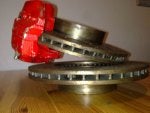Every GT I've ever had has chronically warped it's front brake rotors. Over the years I must've bought 30 rotors, 20 brake calipers, and 5 master cylinders. I've started off with brand new everything, including pads, lines, and fluid, and gone out and done 8-10 rapid slow-downs from 70-80mph and the darn rotors are warped in one day. Steering wheel jiggling all over place every time you touch the brakes. I've used stock asbestos, metallic, and some of the modern eco-friendly pads with the same result. I've bought the cross-drilled, radius-ed, zinc plated rotors that come from some place in California off of eBay and, although they've lasted the longest, still they warp. I flush out my fluid every year. It's tough to tell if it's the rotor warping and smacking the caliper pistons that makes the caliper need replacing too or whether it's the caliper piston seizing or carving a notch in the cylinder walls that then causes the pads to rub the rotors so much that they overheat and warp. Which is it? I've had 8-10 other American cars and they didn't constantly go through rotors and calipers.
Why does it happen? Does the "Big Brakes" mod end the problem? Do other types of Opels have the same problem? Is it just a curse that we all have to live with?
Why does it happen? Does the "Big Brakes" mod end the problem? Do other types of Opels have the same problem? Is it just a curse that we all have to live with?





